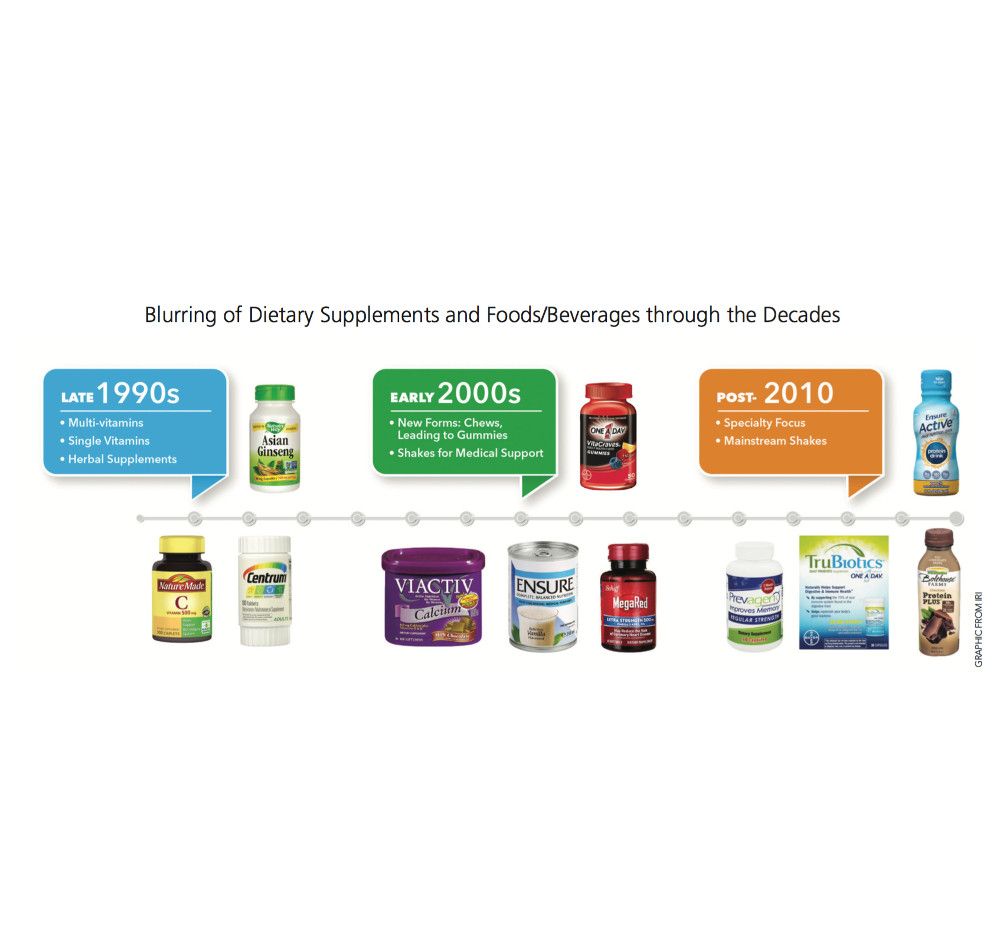Consumers Redefining Dietary Supplement Categories
Today’s consumers have gone after their health and wellness goals with a targeted approach that has changed the face of the supplements market in the past two decades.

By Bob Sanders, Executive Vice President, Healthcare Practice Leader, IRI
Armed with the confidence that comes from their Internet-driven research on the benefits of dietary supplements, today’s consumers have gone after their health and wellness goals with a targeted approach that has changed the face of the supplements market in the past two decades. Today, consumers seek solutions, and not necessarily product categories, which has blurred category lines and opened up opportunities for key, sought-after benefits like immunity, pain relief, and memory, for example.
Diet and supplementation have spurred a hybrid approach combining the benefits of traditional pills and delivery methods with foods and now popular smoothies or shakes to combat chronic ailments and conditions. While 37% of Americans say that food is just as powerful as medicine and that they intentionally eat products such as kale and spinach with known health benefits, nutritionals and supplements will continue to play a critical role because most Americans also say that eating the recommended dietary allowance of a nutrient is often impractical, unhealthy, and expensive to do, according to IRI’s 2017 Self-Care Study. Combined with healthy diets, supplements contribute to consumers’ efforts to seek solutions and drive the self-care movement.
It’s a Mainstream Movement
Most notable in the evolution of supplements throughout the past two decades is their mainstream appeal; no longer are these products just the territory of health food stores. Today’s nutritionals, including vitamins, minerals, herbals, and other supplements, are widely distributed through online and brick-and-mortar retailers, and they’re increasingly sought after by various demographics.
According to IRI’s 2017 Self-Care Study, 85% of Americans say that they continue to engage in self-care activities at a similar level compared with the year prior. Some 15% say they are doing more. Specific to supplements, 22% of respondents say they take more supplements than they did a year ago.
Millennials, in particular, have embraced supplements and are buying and taking more than generations before them. Today’s younger generation of adults is using supplements in daily living and before and after exercising, and they’re honing in on specific products to help them meet their health and fitness goals. This has been a huge mindset shift from the 30-somethings of 20 years ago. Twenty years ago, for instance, by no means could marketers have convinced the 30-something generation to take supplements, while today, this group demonstrates great engagement, potential, and spending power in this space. They’re learning about supplements and their value online, and they’re buying niche products as they work to take control of their health and fitness as well as actively stave off any signs of aging.
Ready-to-drink smoothies have also captured a lot of attention in the past decade, delivering benefits in a convenient, on-the-go format, positioned as the perfect complement to today’s busy lifestyles. Smoothies also allow for inclusion of specific value-added ingredients and removal of others, such as gluten or dairy, as consumers address their unique health goals.
Natural and organic ingredients are also popular, and they reflect a much more globally inspired marketplace than in decades past. Twenty years ago, hot ingredients were antioxidants, vitamins E and C, beta-carotene, and herbals such as ginseng and ginkgo, while today, hot ingredients better reflect our diverse, global ingredient world (think cumin, maca, turmeric, and protein-rich options as well).
As the blurring of nutritional lines continues, it will be harder to differentiate which categories and nutritional benefits are considered mainstream. For instance, consumers may indeed perceive nutritional shakes such as Boost and Ensure as very viable alternatives to meet nutritional needs. In years past, this benefit was only associated with the traditional vitamin supplement category.
The supplements market has grown dramatically, reaching nearly all consumer groups and delivering products in a global marketplace. Self-care is the consumer behavior shift, and health and wellness is the outcome. It is clear that consumers wish to increasingly control their long-term health, and they will seek a much broader, blurred solution set to meet these needs.
Bob Sanders is executive vice president, Healthcare Practice Leader, at IRI (Chicago). IRI is a leading provider of big data, predictive analytics, and forward-looking insights that help CPG, OTC healthcare, retailers, and media companies to grow their businesses.
Also read:
Is 2017 a Better Year for Dietary Supplements than 1998?

HHS announces restructuring plans to consolidate divisions and downsize workforce
Published: March 27th 2025 | Updated: March 27th 2025According to the announcement, the restructuring will save taxpayers $1.8 billion per year by reducing the workforce by 10,000 full-time employees and consolidating the department’s 28 divisions into 15 new divisions.

















